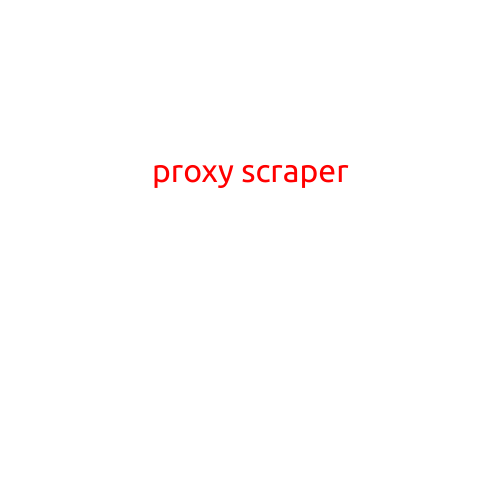
Proxy Scraper: A Game-Changer for Data Extraction and Web Scraping
In today’s digital age, data has become a valuable asset for businesses, organizations, and individuals alike. With the rise of the internet, vast amounts of data are generated every minute, and extracting and analyzing this data has become a crucial task. Web scraping, a technique used to extract data from websites, has become a popular method for data collection. However, web scraping can be challenging, especially when dealing with websites that implement anti-scraping measures, such as CAPTCHAs, rate limiting, and sticky IP blocking. This is where a proxy scraper comes in – a tool that revolutionizes the data extraction process by providing a layer of protection and anonymity.
What is a Proxy Scraper?
A proxy scraper is a software tool that uses proxy servers to extract data from websites, circumventing common anti-scraping obstacles. A proxy server acts as an intermediary between your computer and the website you’re scraping, making it difficult for the website to detect that a scraper is in action. By rotating through multiple proxy servers, a proxy scraper can disguise your IP address, making it seem like multiple users are accessing the website, rather than a single, automated scraper.
How Does a Proxy Scraper Work?
Here’s a step-by-step explanation of how a proxy scraper works:
- Proxy Server Selection: The proxy scraper selects a proxy server from a pool of available servers.
- Connection Establishment: The proxy scraper establishes a connection with the website using the selected proxy server.
- Extracting Data: The proxy scraper extracts the desired data from the website, while the proxy server masks your IP address.
- Data Storage: The extracted data is stored in a database or file, ready for further analysis or processing.
Benefits of Using a Proxy Scraper
Using a proxy scraper can greatly improve the efficiency and effectiveness of web scraping, with numerous benefits, including:
- Anonymity: Proxy scrapers provide anonymity, making it difficult for websites to detect and block your scraping activities.
- Scalability: Proxy scrapers can handle large volumes of data extraction, making them ideal for big data projects.
- Accuracy: By using multiple proxy servers, proxy scrapers can reduce the risk of data corruption and errors.
- Legality: Using a proxy scraper can help ensure that your web scraping activities comply with website terms of service and anti-scraping laws.
Challenges and Limitations of Proxy Scrapers
While proxy scrapers are powerful tools, they’re not without their challenges and limitations:
- Proxy Server Maintenance: Maintaining a pool of high-quality proxy servers can be a task in itself.
- IP Blocking: Websies can still block your IP address if they’re aware of your scraping activities.
- Data Quality: The quality of the extracted data may vary depending on the proxy server’s reliability.
- Cost: Using a proxy scraper can be expensive, especially if you require a large number of proxy servers.
Conclusion
In conclusion, a proxy scraper is a valuable tool for anyone serious about web scraping and data extraction. By providing a layer of protection and anonymity, proxy scrapers can help you bypass common anti-scraping measures and extract data efficiently and effectively. However, it’s essential to understand the challenges and limitations associated with using a proxy scraper and to maintain high-quality proxy servers to ensure the success of your web scraping project.
Whether you’re a business looking to gain a competitive edge, a researcher seeking to analyze large data sets, or an individual looking to automate routine tasks, a proxy scraper can help you achieve your goals.





